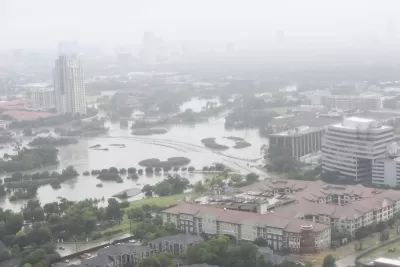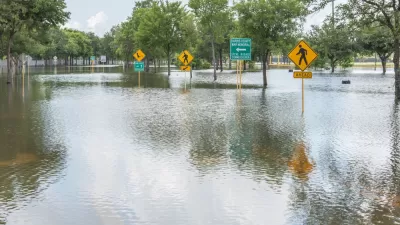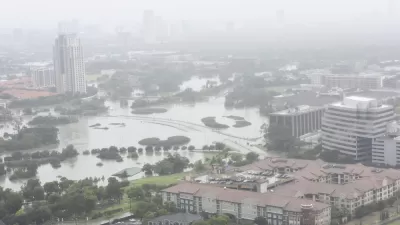As Houston's flood waters recede and attention turns from rescue to recovery and soon rebuilding, critics have pointed to the city's lack of zoning as the cause of the devastation. But are they looking in the right direction?

"As we watch Houston struggle with the catastrophic flooding associated with Hurricane Harvey’s biblical levels of rainfall, it is easy (from a safe distance, anyway) to get judgmental about the city’s famous lack of land-use planning," writes Ed Kilgore, political columnist for New York Magazine.
Houston legendarily has no zoning. The resulting haphazardness of its patterns of development, we may imagine, make the city a sitting duck for all sorts of disasters.
But doesn't a lack of zoning cause sprawl? If that was the only contributor, Planetizen's sprawl tag would only have articles pertaining to America's fourth largest city.
It’s true that Houston’s sprawl does invite problems, but it’s only partially true that the sprawl is a result of its lack of zoning...But the bigger problem is a lack of regional planning. Development has overwhelmed the city’s World War II–era reservoir system of flood control and consumed the wetlands that absorb excess rainwater.
Kilgore cites the now much-referenced ProPublica series, "Hell And High Water: Preparing Houston For The Next Big Storm."
"In Harris County alone, research by Texas A&M scientist John Jacob shows, almost 30 percent of freshwater wetlands were lost between 1992 and 2010, a figure he calls 'unconscionable,'" wrote three reporters: Neena Satija, The Texas Tribune and Reveal; Kiah Collier, The Texas Tribune; and Al Shaw, ProPublica.
Another insightful piece questioning the culpability of Houston's lack of zoning for the disaster was written by Henry Grabar, a staff writer for Slate’s "Moneybox."
The most important thing is this: No city is or should be designed to accommodate a one-in-a-million-year flood, which is what Harvey turned out to be.
For more discussion on whether zoning would have helped Houston whether the epic flooding caused by Hurricane Harvey, see blog post by Planetizen contributor Michael Lewyn.
FULL STORY: More Zoning Wouldn’t Have Protected Houston From Harvey’s Fury, But Less Sprawl Would Have Helped

Maui's Vacation Rental Debate Turns Ugly
Verbal attacks, misinformation campaigns and fistfights plague a high-stakes debate to convert thousands of vacation rentals into long-term housing.

Planetizen Federal Action Tracker
A weekly monitor of how Trump’s orders and actions are impacting planners and planning in America.

In Urban Planning, AI Prompting Could be the New Design Thinking
Creativity has long been key to great urban design. What if we see AI as our new creative partner?

Cal Fire Chatbot Fails to Answer Basic Questions
An AI chatbot designed to provide information about wildfires can’t answer questions about evacuation orders, among other problems.

What Happens if Trump Kills Section 8?
The Trump admin aims to slash federal rental aid by nearly half and shift distribution to states. Experts warn this could spike homelessness and destabilize communities nationwide.

Sean Duffy Targets Rainbow Crosswalks in Road Safety Efforts
Despite evidence that colorful crosswalks actually improve intersection safety — and the lack of almost any crosswalks at all on the nation’s most dangerous arterial roads — U.S. Transportation Secretary Duffy is calling on states to remove them.
Urban Design for Planners 1: Software Tools
This six-course series explores essential urban design concepts using open source software and equips planners with the tools they need to participate fully in the urban design process.
Planning for Universal Design
Learn the tools for implementing Universal Design in planning regulations.
Appalachian Highlands Housing Partners
Gallatin County Department of Planning & Community Development
Heyer Gruel & Associates PA
Mpact (founded as Rail~Volution)
City of Camden Redevelopment Agency
City of Astoria
City of Portland
City of Laramie





























